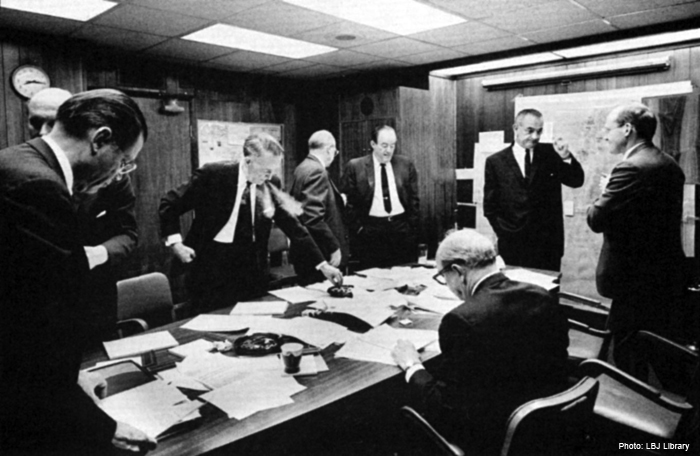
To comprehensively understand the role of the United States in the Six Day War, we need to look at the political history between the United States and Middle Eastern countries, especially Israel, in the decades leading up to the war:
The U.S.-Israeli partnership is universally acknowledged as special, and for good reasons. In the economic sphere, for example, Israel has long been the recipient of the single largest endowment of American financial aid, that for a country of only 5.5 million people. Also, strangely enough, the first free-trade zone established by the United States was with Israel, a small country a distance of six thousand miles away. The special friendship also covers their cooperative military and intelligence operations. Such cooperation is not fully harmonious, but its scope is unprecedented, even compared with America’s unique common history with Great Britain (Sandler 933). When it comes to diplomacy, the United States has on several occasions vetoed United Nations Security Council resolutions seen to be anti-Israel or detrimental to diplomatic processes, despite protests from the rest of the international community, which includes some major U.S. allies. But the word “special” has different meanings to different entities. To adversaries of Israel and the United States looking at this unusual arrangement from the outside, “special” has come to mean particularly evil. They see the combine as malevolent in intent and accuse them of spreading conspiracies. Even within the U.S.-Israeli relationship, for those with emotional and political stakes in the partnership “special” has often meant specially unpredictable and prone to ulcerate anyone related to it.
The political systems of Israel and United States make them natural allies. Israel is the sole democracy in the Middle East and takes great pride in that fact. And the United States is willing to oblige to requests of assistance for the same reason (Ash 42). However, it should be noted that the treatment of Arabs on the Israel controlled territories are not acts worthy of admiration and the role of United States in the Middle East should be evaluated by taking this into account.
“The fact that Israel and the United States never shared the same fundamental adversary explains the lack of a formal alliance between them. But true alliances arise only to fight or deter a common enemy, and in this case there was only a common interest – Israel’s survival – and arguments over how best to ensure it. That, then, is another way in which the U.S.-Israeli relationship has been unique: it is commonly understood as an alliance but lacks both the formal, legal aspects and the underlying rationale of an alliance.” (Tal 840)
Of course, U.S.-Israeli relations have never been based solely on such political factors alone. Beyond the hard-nosed calculations of power politics and competition for global dominance are more emotional and cultural aspects of the partnership. This relationship had bound a small, vulnerable democracy of a people persecuted throughout history, to a large and secure democracy of many different peoples drawing from a common heritage. Such underlying factors have what made the U.S.-Israeli relationship a special one . Additional emotional bonds grew as a consequence of the Holocaust and the associated inward guilt, as well as the related concern of the American majority toward Jews following World War Two, which benefited the State of Israel.
During the last few decades of the 19th century, the Jews of Russia migrated to America , as it was believed to be both safe and economically promising. Terrorism was also more prevalent in Palestine at the time, which was another reason why the Russian Jewry preferred the United States over all other states. After the establishment of the state of Israel in 1948, it depended on America for food and diplomatic support; later during the six day war and the war of 1973, for weapons and economic aid. So, the U.S.-Israel relation was very strong right thru the history of the 20th century. Also, American Jews have, in the past, helped Israelis with money and lobbied for policies favoring them. Of course, the political and economic clout of American Jews had a big role to play in this (Sandler 935).